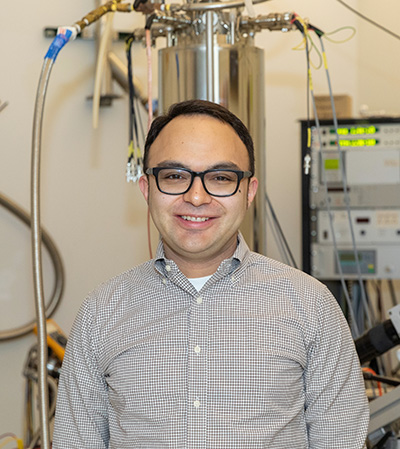Campus News
Physicist Jairo Velasco Jr. wins $1.25 million award from Moore Foundation
The Moore Foundation’s Experimental Physics Investigators Initiative supports outstanding U.S. experimental physicists pursuing transformative research.

Jairo Velasco Jr., associate professor of physics at UC Santa Cruz, will receive $1.25 million over the next five years from the Gordon and Betty Moore Foundation to advance his research in experimental physics and quantum information science.
Velasco studies the novel physical properties of atomically thin materials known as two-dimensional (2D) materials. Defects or imperfections in the atomic structure of 2D materials have properties that are potentially useful for the development of quantum information technologies, such as quantum computers, which encode information as quantum bits (qubits). One promising avenue for creating qubits is through the manipulation of spin, an intrinsic quantum property of electrons and other particles which causes them to act like tiny magnets.
“The spins hosted by point defects in 2D materials are a promising platform for future quantum information processing hardware, which operates under distinct principles compared to our existing technology,” Velasco said. “Enhancing fundamental understanding of this potential platform may enable new computers and sensors with unprecedented speed, sensitivity, and functionalities.”
In previous work, Velasco’s lab has made important contributions in characterizing quantum states in 2D materials, including the first direct visualization of quantum dots in bilayer graphene.
The Moore Foundation funding will enable Velasco to expand his research on quantum systems in order to characterize their dynamic properties. In particular, he wants to measure the lifetimes of quantum states (the spin relaxation and decoherence time) hosted by point defects. Using cutting-edge, flexible tools with atomic-scale spatial resolution and high energetic precision, Velasco’s lab will be working to determine the identity of individual defects in 2D materials and to characterize their spin dynamics.
“This is crucial knowledge for advancing the viability of 2D point defects as a future quantum information processing platform,” he said. “It’s a new direction for my lab, and I’m very excited to begin probing the dynamics of these systems.”
The new funding will also support Velasco’s educational activities, including undergraduate and graduate students working in his lab, as well as his work with high school students through programs such as COSMOS and SIP.
“This is a good time for students to get involved in quantum information science,” Velasco said. “They will learn a lot of fundamental science, as well as skills and training that will position them for employment in this emerging field.”
Velasco is among 16 U.S. experimental physicists receiving support through the Moore Foundation’s Experimental Physics Investigators Initiative. These awards provide an opportunity for outstanding scientists to pursue transformative research during a critical time in their careers directly following attainment of tenure.
“The breadth and scientific audacity of experiments proposed by these individuals is stunning and inspiring,” said the initiative’s program director Theodore Hodapp. “Stunning, as well, is the creativity and capabilities of these scientists.”
The initiative will also support the work of this and future cohorts by providing equipment grants and by hosting convenings to share new ideas and encourage collaborations. Central to this initiative is supporting the investigators as they strive to make their research groups inclusive and advance equity in their departments.